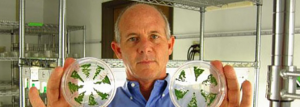Nutraceuticals & Nutrition
Nutraceutical production in algae
UC San Diego and Scripps Oceanography have formed the interdisciplinary research unit, Food and Fuel for the 21st Century (FF21). FF21 facilitates interdisciplinary collaboration to tackle the significant research objectives regarding the use of photosynthetic organisms for enhanced food production and energy independence that cannot be addressed by any one discipline alone. Part of FF21 is the California Center for Algae Biotechnology (Cal-CAB), where UCSD and Scripps Oceanography researchers interface with industry leaders to facilitate the commercialization of algae biofuel and bio-product development. Cal-CAB researchers are developing cutting edge technology for engineering algae as nutraceutical factories on a large scale.
PIs: Andrew Allen, Eric Allen, Bianca Brahamsha, Jules Jaffe, Michael Latz, Stephen Mayfield, B. Greg Mitchell, Brian Palenik
PUFA production in marine bacteria
Microbial synthesis of fatty-acid-derived hydrocarbon molecules, like Omega-3 poly-unsaturated fatty acids (PUFAs) has garnered intense interest in recent years as potential sources of renewable fuels and chemicals. Realization of this potential necessitates a molecular-level understanding of the genes and gene functions involved in microbial hydrocarbon biosynthesis and their relationship with the fatty acid biosynthetic processes that provide the chemical backbone for these hydrocarbon products. Scripps researchers are working to understand and manipulate the underlying genetic basis for Omega-3 PUFA production. Current projects focus on several newly discovered microbial biosynthetic pathways catalyzing the formation of secondary lipids, accessory lipid molecules that are chemically distinct from core (primary) fatty acid products and synthesized via a novel biosynthetic mechanism in diverse microbial lineages.
PIs: Eric Allen
Algae as nutritional supplement to improve gut health and microbiome
Algae has long been a source for nutrition and Cal-CAB scientists are working to determine the scientific benefits of algae as a nutritional supplement. Multiple animal trials have indicated that consuming small amounts of a particular algae (1% of a normal diet) supports normal healthy gut function, including improved digestion, and reduced instances of intestinal distress. Given these compelling results, Cal-CAB researchers are interested in understanding whether similar effects can be realized in humans, and whether this improvement in gut health is correlated with improvements in the gut microbiome of humans. This is the first time that the nutritious green algae is available for human consumption and also the first trial to evaluate its potential impact on human gut health.
PIs: Embriette Hyde, Stephen Mayfield
Work with Scripps
- Access leading scientists in bio-inspired design, algae technologies, and biomimicry
- Design collaborative research
- Get a seat at the table for the latest scientific updates
- Learn how to implement newest expertise & methods
- Work with talented Scripps students and postdocs as potential hires


Dr. Eric Allen, Associate Professor
Scripps Institution of Oceanography

Dr. Stephen Mayfield, Professor
Biological Sciences
Director, California Center for Algae Biotechnology
